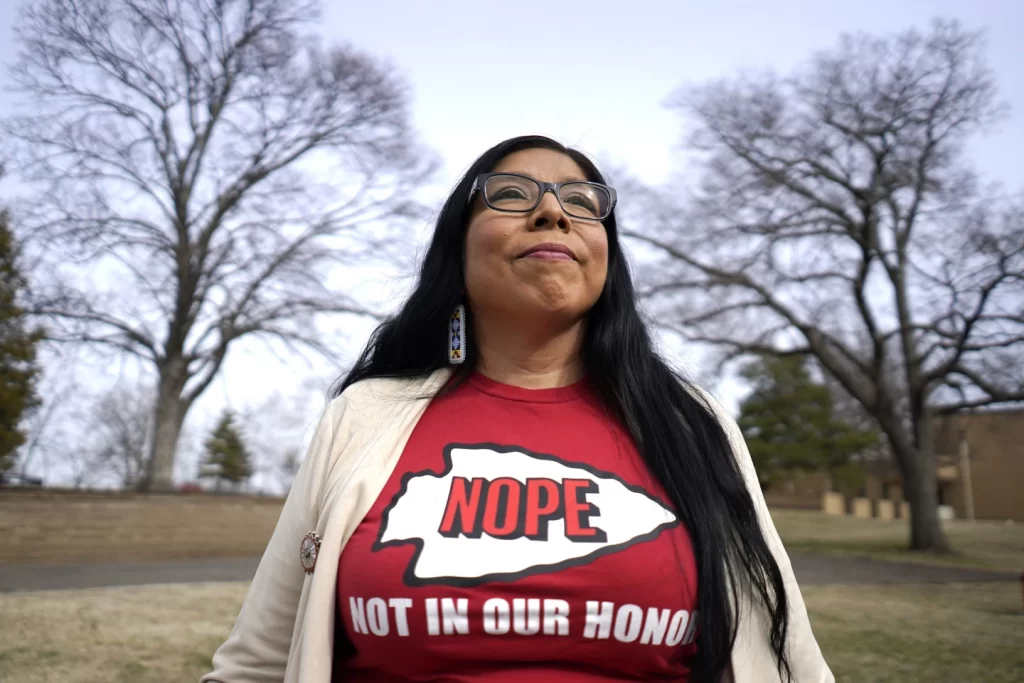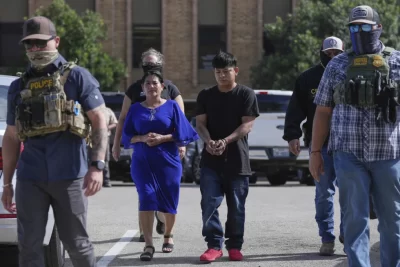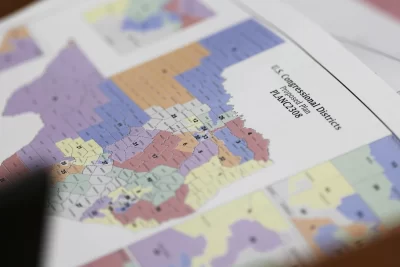
Rhonda LeValdo is exhausted, but she’s refusing to slow down. For the fourth time in five years, her hometown team and the focus of her decadeslong activism against the use of Native American imagery and references in sports is in the Super Bowl.
As the Kansas City Chiefs prepare for Sunday’s big game, so does LeValdo. She and dozens of other Indigenous activists are in Las Vegas to protest and demand the team change its name and ditch its logo and rituals they say are offensive.
“I’ve spent so much of my personal time and money on this issue. I really hoped that our kids wouldn’t have to deal with this,” said LeValdo, who founded and leads a group called Not In Our Honor. “But here we go again.”
Her concern for children is founded. Research has shown the use of Native American imagery and stereotypes in sports have negative psychological effects on Native youth and encourage non-Native children to discriminate against them.
“There’s no other group in this country subjected to this kind of cultural degradation,” said Phil Gover, who founded a school dedicated to Native youth in Oklahoma City.
“It’s demeaning. It tells Native kids that the rest of society, the only thing they ever care to know about you and your culture are these mocking minstrel shows,” he said, adding that what non-Native children learn are stereotypes.
LeValdo, an Acoma Pueblo journalist and faculty member at Haskell Indian Nations University, has been in the Kansas City area for more than two decades.
She arrived from Nevada as a college student. In 2005, when Kansas City was playing Washington’s football team, she and other Indigenous students organized around their anger at the offensive names and iconography used by both teams.
Some sports franchises made changes in the wake of the 2020 police killing of George Floyd in Minneapolis. The Washington team dropped its name, which is considered a racial slur, after calls dating back to the 1960s by Native advocates such as Suzan Harjo. In 2021, the Cleveland baseball team changed its name from the Indians to the Guardians.
Ahead of the 2020 season, the Chiefs barred fans from wearing headdresses or face paint referencing or appropriating Native American culture in Arrowhead Stadium, though some still have.
“End Racism” was written in the end zone. Players put decals on their helmets with similar slogans or names of Black people killed by police.
“We were like, ‘Wow, you guys put this on the helmets and on the field, but look at your name and what you guys are doing,’” LeValdo said.
The next year, the Chiefs retired their mascot, a horse named Warpaint that a cheerleader would ride onto the field every time the team scored a touchdown. In the 1960s, a man wearing a headdress rode the horse.
The team’s name and arrowhead logo remain, as does the “tomahawk chop,” in which fans chant and swing a forearm up and down in a ritual that is not unique to the Chiefs.
The added attention on the team this season thanks to singer Taylor Swift’s relationship with tight end Travis Kelce isn’t lost on Indigenous activists. LeValdo said her fellow activists made a sign for this weekend reading, “Taylor Swift doesn’t do the chop. Be like Taylor.”
“We were watching. We were looking to see if she was going to do it. But she never did,” LeValdo said.
The Chiefs say the team was named after Kansas City Mayor H. Roe Bartle, who was nicknamed “The Chief” and helped lure the franchise from Dallas in 1963.
They also say they have worked in recent years to eliminate offensive imagery.
“We’ve done more over the last seven years, I think, than any other team to raise awareness and educate ourselves,” Chiefs President Mark Donovan said ahead of last year’s Super Bowl.
The team has made a point to highlight two Indigenous players: long snapper James Winchester, a citizen of the Choctaw Nation of Oklahoma, and center Creed Humphrey, who is from the Citizen Potawatomi Nation of Oklahoma.
In 2014, the Chiefs launched the American Indian Community Working Group, which has Native Americans serving as advisers, to educate the team on issues facing the Indigenous population. As a result, Native American representatives have been featured at games, sometimes offering ceremonial blessings.
“The members of that working group weren’t people that were involved in any of the organizations that actually serve Natives in Kansas City,” said Gaylene Crouser, executive director of the Kansas City Indian Center, which provides health, welfare and cultural services to the Indigenous community. Crouser is among those who plan to protest in Las Vegas this weekend.
Democratic U.S. Rep. Emanuel Cleaver sees the label “Chief” as a term of endearment. He has been a Chiefs fan since he moved to Kansas City more than half a century ago, though he said it “wouldn’t bother me that much” if the name were changed.




